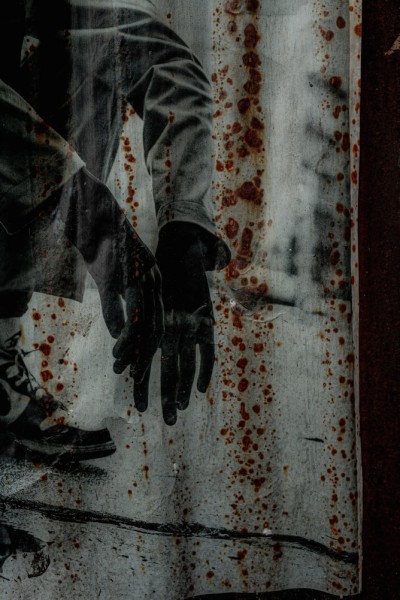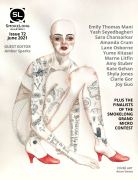Content Warning: Extreme Violence
We encountered you, my friends and I, on a drizzly evening in 2013, several months into a wave of mob violence—entire neighbourhoods beating the living crap out of alleged thieves because “we’re struggling and unsafe and they’re stealing from us and the police won’t help us.” Your murder was the most gruesome. You lay on the side of the road, encircled by a gang of civilians clamouring for your death. I stood on the opposite side of the road, in my sleeveless dress with pink and white stripes looking vibrant and feeling guilty about it. I spent the half hour or so pretending to look at you so I only caught a glimpse of your skull, or maybe it was some other part of your flesh, severely burnt, the white of your fat or bones sticking out like life in a graveyard.
You were an alleged carjacker. Before we got there, you had been beaten and set on fire but there you lay, occasionally writhing but mostly still, seemingly un-feeling of the rain that kept extinguishing the flames of your personal hell.
I stood shivering, ducking behind my taller friends, tugging at their elbows, needing us to leave. Maybe I was cold but there was also something bone-chilling about a population so indifferent— excited even—by a violent extinguishing of life.
My mother kept calling and I kept ignoring her calls. I didn’t want her to know where I was. And so the minutes passed. You on the tarmac, refusing to die, your murderers getting enraged at your audacity and me cycling through various mental states, trying not to cry. There was praying to God to end this, cursing at your spirit for refusing this ghastly snuffing, wishing the police would show up and eventually disillusionment at the realisation that none of us was getting justice—just trauma and smoke in our lungs. I was eighteen and I thought if the police intervened, your life could be saved and we could end this vicious cycle. Now that I’m much older and a lot more informed on the conceptualisation and working of the police in Kenya, I know that the police, even though they were only about a kilometre away, were never going to show up. Serving the needs of poor communities is in actuality, not why the police exist. I also know that our current understanding of justice is synonymous with punishment which especially for poor, Black people, has always been a public spectacle.
In the end someone, itching to get it over with, dropped a huge rock on your head. It was a swift movement, a moment saturated with gasps and cheers and by the time I found it in me to look, you were as still as before, just your blood spattered on the shoes of the man standing closest to you. My friends and I walked home. We tried to make casual conversation but the spectacle of your death, like the smoke that was still in the air, was lodged in our throats and the best we could do was swallow and hope to drown that incident, and our complicity, in the pits of our stomachs.
My mother was furious when I got home. I sat through her lecture but didn’t hear a thing. I mostly thought about your mother. Where was she? What did she do when she found out about how you died? Did she have comfort and tenderness in her grief or was she also villianised and held responsible for your actions? Did she know that your livelihood—her livelihood—was sustained by the thing that got you killed? I wondered what broke for her and if it was the same thing that broke for you. What specific ways were you failed in life and did they have a cruel familiarity with the ways you were failed in death?
I heard that you still weren’t dead when the police eventually showed up. Nonetheless, they threw you in the back of their van and disposed of you in a morgue. I heard that the morgue attendant was hesitant about prepping you but what else could be done? He must have sat there, drinking his liquor, waiting for you to die. Did it hurt? The cold and stench of the morgue—did you feel it?
The town-council workers cleaned what remained of your death from the road. It’s a fruit stand now. Once I heard someone say that if maybe you’d eaten a lot more fruits in your life, you wouldn’t be so fat and your death wouldn’t have been as slow. You were fat, Black and poor—of course you were blamed for the ways we’re brutalised and killed.



 The core workshop of SmokeLong Fitness is all in writing, so you can take part from anywhere at anytime. We are excited about creating a supportive, consistent and structured environment for flash writers to work on their craft in a community. We are thrilled and proud to say that our workshop participants have won, placed, or been listed in every major flash competition. Community works.
The core workshop of SmokeLong Fitness is all in writing, so you can take part from anywhere at anytime. We are excited about creating a supportive, consistent and structured environment for flash writers to work on their craft in a community. We are thrilled and proud to say that our workshop participants have won, placed, or been listed in every major flash competition. Community works.